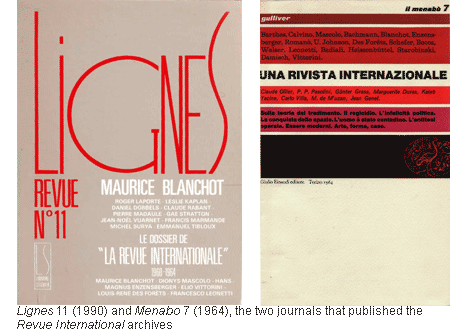“Ever tried. Ever failed. No matter. Try again. Fail again. Fail better.”
Samuel Beckett, Worstward Ho
In early 1963 they admitted defeat. Conceived in late 1960, Revue internationale was intended by its French, German and Italian founders to be the historic realization of the idea of a “plural writing”. Yet it remained a project and no more. In 1964, a record of the collated material appeared in Italy. Hans Magnus Enzensberger called it the “remnants of a shipwreck”.
Ships run into trouble not when they are in the harbour but when they are on the high seas. If the boards shatter, then the collapse, in all senses, is the result of great activity. Failure results from aiming too high.
This is where the idea of an international journal comes into its own. At the point of failure it is most true to itself. “For indeed”, as Daniel Defoe noted as early as 1697 in his Essay upon Projects, “the true definition of a project, according to modern acceptation, is […] a vast undertaking, too big to be managed, and therefore likely enough to come to nothing.” Defoe portrays the project-maker as a Promethean figure drawing up plans at the margins of the era, stretching the limits of what the era allows. Fascinated yet at sea, he knows that, as he steps into the realm of practice, he may run aground. As he wrote these words, Defoe, the writer and businessman, may well have been thinking of the mountain of debt his own commercial failures had saddled him with.
From the perspective of a “poetics of failure”, then, successful enterprises are suspect of having played it safe from the start. Whatever can be achieved effortlessly, without a critical mass of aspirations, hopes and adversity, cannot claim the title of “project” in the emphatic sense. Somewhere below there runs a line separating projects from things one simply does (admittedly, this line has been drawn absurdly low in recent years, so that today even the most banal tasks in life qualify).
Not so when planning a journal. For Defoe, this would rate as virtually the archetypal project. Success is the exception. If a journal does make it past the planning stages, then situations of crisis and radical change, particularly economic ones, are propitious moments for it. Sometimes, frontal attacks on the public sphere subsidized by the state and private trusts help get magazines established and temporarily keep them afloat (naming no names). Sometimes the time is simply right. More honest than relating the history of journals chronologically, as a never-ending succession of titles and media innovations since the Journal des Sçavans of 1665, would be a kairological account, as the history of plans, desires, latent possibilities and the odd successful coup.
An archaeology of the unpublished is thus posed with the task of unearthing the foundations of the established periodicals of our era. The first stratum contains the archived plans for the many journals that folded before their first issue; further below lies an almost incalculable number of ambitions that never made it as far as index cards in the archive, but were recorded at some point in footnotes, if that.
Those who wish to drill deeper require the instruments of psychoanalysis. It is unlikely, though, that there is much to discover down there that furthers our understanding of journals. Certainly, writer’s block, moments of hesitation and the problematic biographies of project-makers all have their place in the intellectual economy of desire. But as we explore, we should not forget what is central. In magazine projects, it is the communal in communicating (Mit-Teilung) that is the key: the attempt to take advantage of historical constellations in order to open up a space for collective thought and action. What follows, then, is an account of two such projects: Walter Benjamin’s and Bertolt Brecht’s Krise und Kritik (Crisis and Criticism), and Revue internationale.

Krise und Kritik
During the Great Depression, c.1930, Walter Benjamin and Bertolt Brecht sat down together to discuss plans for a journal (other leading figures in the project were Herbert Ihering, Bernard von Brentano, Ernst Bloch, Siegfried Kracauer, Alfred Kurella and Georg Lukács). The literary historian Erdmut Wizisla has rescued the plans for this ambitious project from oblivion. Krise und Kritik, the magazine’s working title, makes clear that Benjamin and Brecht were setting out to broaden the concept of criticism by assigning it a crucial mediating role between aesthetic commitment and worldly engagement. The criticism in their magazine was not supposed to remain confined to literature and the theatre, but rather would embrace all areas of life. Wizisla summarized the editorial discussions as follows: “Criticism, as envisaged by the participants in the discussions, was drastic, effective and consequential, a criticism which […] [in Brecht’s words] […] would be perceived in such a way that ‘politics is its continuation by other means’.”
Convinced that revolution was imminent (this was before the experience of 1933), Benjamin and Brecht went as far as wanting to help the decisive “crisis” on its way. “The journal’s field of activity”, wrote Benjamin, “is the present crisis in all areas of ideology, and it is the task of the journal to register this crisis or to bring it about, and this by means of criticism”. The relationship of leftwing intellectuals to their publications could not be more clearly formulated: if M. Rainer Lepsius’ famous comment that “criticism is the profession of intellectuals” holds true, then what we have here is a subversion of that job description, one that reconnects the critic with the revolutionary project. Brecht and Benjamin work towards what Brecht henceforth calls “interventionist thinking” (eingreifendes Denken): criticism not as a final judgement, but as collective action. A plan for a journal was, typically, their chosen medium for reconciling literature and revolution.
The design of the project puts aesthetic-material questions – of media technologies and styles of writing, for instance – on to a level with questions of content. But while the “overall approach” of the journal was to have a “heavy leftward slant”, issues of form and editorial process were not to be sacrificed to political ends. On the contrary, Brecht and Benjamin’s high standards derived from their view that the formal radicalism of literary modernism was an unavoidable precondition of socially effective criticism – a view that also explains the ease with which they were able to connect with the artistic avant-garde. It was important to maintain the resulting tension. Any “scientific” founding of criticism had to respect the “technical standard” of literature and make it productive, even if this clashed with the taste-based criticisms of the middle classes. The crisis in the 1920s and ’30s seemed to serve Brecht and Benjamin perfectly in their aim of confronting the “bourgeois” camp with the progressive elements inherent in their own literature, driving these beyond themselves, so to speak. Benjamin later wrote: “The journal was meant to contribute to the propaganda of dialectical materialism by applying it to questions that the bourgeois intelligentsia is forced to acknowledge as those most particularly characteristic of itself.”
On their way towards journalistic praxis, both editors began to develop a “catalogue of writing styles” for Krise und Kritik. Benjamin introduced the idea of a “physical” style of writing that would “require experimentation”. Brecht qualified this further, insisting that literature of this kind, which he called “practice” (Übung), corresponded ultimately to a “stage of social life realizable only through actual revolution, or a totally literarized life”.
Here the project dynamics came into play. Having dealt with the question of the articulation of politics and literature, Krise und Kritik reached the second threshold of ambitious journal-making: “How do we want to work?” “Together!” answered Brecht and Benjamin, and thus found themselves in uncharted waters from which no editorial collective has ever returned to tell the tale.
According to Edmund Wizisla’s version of events, they planned to guarantee, by means of committees and collective responsibility of all collaborators, that the journal would work towards common principles and be publicly answerable for what had been written. The idea was as far as possible to anticipate the literary communism of the “practice” in the editorial circle. This went too far for some. Ernst Bloch, for one, was hesitant to hand over his authority and growing fame to the “guidelines” of a collective. There was something of the “cliquey” about it, he wrote to his later wife, and besides “the alliance of the pure man of genius, Benjamin, with the unwashed genius Brecht is exceedingly curious”. Wizisla concludes prosaically that “the collective to which the group aspired remained a pipe dream”.
When the first essays for Krise und Kritik eventually arrived, Benjamin backed down in disappointment. They had not succeeded committing their collaborators to a new critical and collective form. It would have been possible to put together a leftwing magazine with the contributions they had, but the Weimar Republic had enough of those already. What the editors were attempting was more of an “experimental arrangement”, which as Brecht remarked “gives a picture of a factory in operation”. The planning went on for a little while more, but the momentum was gone. In the final analysis, the same was true of Krise und Kritik as what Joachim Kirchner had, in his history of journals, said about Schiller’s prototypical Horen project: “[The journalistic enterprise] demands our attention perhaps more on account of what its editor, pursuing the ideal flight of his thoughts, was striving for with this monthly journal, than the actual results […] The outstanding writers of the age, such as Goethe, Herder, Wilhelm von Humboldt, Kant, Fichte, Woltmann and many more, had been invited by Schiller and had promised to collaborate. But even before the first issue of Horen appeared in 1795, the editor realized that the promises were not being kept and that the few articles that had been received in no way matched up to his expectations.”
Revue internationale
There is no indication that Maurice Blanchot was aware he was setting forth the ambitions of Krise und Kritik when he started up his project for an international journal in the winter of 1960-61. The moment was every bit as promising as it had been thirty years before. As Reinhart Koselleck wrote in 1959 in the introduction to his book Critique and Crisis: “The present world crisis, characterized by the polar tensions between the world powers America and Russia, is from a historical point of view the consequence of European history. European history has expanded to become world history and has found its logical conclusion therein, in that the whole world has reached a state of permanent crisis…” The nervous mood of changing times was in the air. In 1930, the Depression, revolution and the threat of fascism had marked the terrain of “interventionist thinking”; now, the great challenge for intellectuals in the early Sixties, in a world shaped by decolonization and bloc confrontation, was to internationalize. They had no choice if they were to regain the space to operate and the capacity to describe; from now on, wrote Blanchot to writer colleagues in Italy and Germany, “all problems are international”. What did that mean for political and literary writing? The answer was provided by the plans for a journal drawn up between the winter of 1960-61 and early 1963, among the most radical in the history of twentieth century journal publishing.
Involved were over twenty authors of various nationalities and languages. The core was made up by Maurice Blanchot, Dionys Mascolo and Elio Vittorini, to which, over the course of time, came Ingeborg Bachmann, Walter Boehlich, Hans Magnus Enzensberger, Günter Grass, Helmut Heißenbüttel, Uwe Johnson, Martin Walser and Peter Rühmkorf from the German-speaking countries; Italo Calvino and Francesco Leonetti from Italy; Robert Antelme, Roland Barthes, Michel Butor, Marguerite Duras, Louis-René des Forêts, Michel Leiris and Maurice Nadeau from France; and Leszek Kolakowski from Poland.
The project suffered countless obstacles, conflicts, setbacks and diverging interests too numerous to discuss here. The crucial point is that Revue internationale failed not because it was impossible to create an international magazine in 1960 – an international magazine understood, at any rate, as one to which a group of authors, kindred both politically and in literary terms, contributed texts, publishing them regularly under common editorship in several countries. That is what the German participants had in mind around 1960. All the authors and the three publishing houses Suhrkamp, Einaudi and Julliard were willing.
But Blanchot and his friends in Paris wanted more. “I recently said to Robert [Antelme] and Dionys [Mascolo]” wrote Blanchot in a letter to Elio Vittorini, “that we wouldn’t be facing any of the difficulties that beset us if our goal were exclusively an international political journal.” As with Krise und Kritik, the aim of this “experimental arrangement” was not merely the launch of another magazine, however effective and, in the weak sense, international it might be. The challenge was rather to develop a new form of writing, a new way of working. “As an international journal, it has to be international in some fundamental sense,” demanded Blanchot in his sketch for the project. If Brecht and Benjamin had tried to commit bourgeois intellectuals to their own radicalism in a process of radical, immanent critique, the idea was now to provide writers with ways of collectively exceeding their national status quo. Were it to achieve this, wrote Blanchot, it would prove that a magazine can be “a collective, creative work of going beyond, a work of oriented demands that, by the very fact that the review exists, leads participants farther along its own path and also perhaps on a slightly different path from the one they would have followed on their own.”
The first step towards the collective space of writing is connected with the surrender of the sovereignty and authority acquired in one’s own, national public sphere. Only then is “total criticism” possible. Every writer-publisher must brief colleagues about political events in their countries, so that they can then write up the article. Each contributor is thus responsible for the texts of the others, texts he or she has not written yet must defend to his or her native audience. “This is the meaning of the review as a collective possibility,” according to the Paris editors, and therein lay the project’s ambitiousness. At the risk of failure – nothing less would do. Only then can failure be “utopian”: “If we have not fully decided on this collective effort, it is better not to undertake anything at all. At the same time, it is possible that a collegial editorship may not be practically attainable; that may be; in that case, we will renounce it, be we have to verify it through experience and, if it is a utopia, accept failing utopically.”
It might be guessed that someone would express the same misgivings about Blanchot’s ideas as those raised by Ernst Bloch against Krise und Kritik – especially since Revue internationale went beyond Brecht and Benjamin’s plan, which remained committed to the classical essay form. Blanchot exploded this, taking inspiration from Friedrich Schlegel and the écriture experiments of early Romanticism, where dialogue is famously a “chain of fragments”. Yet this too Blanchot prised open, internationalizing the production and articulation of individual elements; in his Athenaeum essay of 1964, he attacked Schlegel’s dictum that a fragment “must, like a miniature work of art, be entirely isolated from the surrounding world and complete in itself, like a hedgehog”. “Le cours des choses” [The Course of Events], the central section of Revue internationale, would be characterized by a radically unfinished, collective, perhaps even anonymous “écriture fragmentaire”.
Among the German participants, however, heavily theoretical reflections couched in fragmentary text-form met with ideological suspicion. In a meeting of the editors in 1963 in Paris, Uwe Johnson gave to understand that, in the French texts, political events were “portrayed so indifferently and indirectly; but the German publishers expect direct and explicit views, from their journal too”. Helmut Heißenbüttel had already likened the French contributions to an “Ernst Jünger-style philosophy of fragments”.
Yet the intention was the opposite. Just as Brecht had developed his “interventionist thinking”, so Blanchot developed the fragmented “writing in the plural”, characteristic of his late work, in the eminently political framework of a journal project. “Ecriture fragmentaire” was not intended to be raised above political issues of the time; rather, it offered writers a new way to “say the world” (Blanchot). Of course, this was a world in pieces, a divided world; one in which, in 1961, the Wall was built. “The problem of division – of fracture – as Berlin poses it […]” wrote Blanchot in a fragment for the first issue, “is a problem that one can only formulate adequately, in its complete reality, by deciding to formulate it in a fragmentary way (which does not mean in a partial way).” In retrospect, it is clear that the collective chain of fragments was the expression of a hope: its ethic emerges as the possibility of togetherness in difference.
It never came to that. The community of writers to which the project aspired collapsed along the very same national and intellectual boundaries it had set out to overcome. As Christophe Bident observes, it is as if Blanchot’s later fragments were a sad memory of what, in the community of an “essentially international journal”, genuine “écriture plurielle” might have been.
Thirty years after the failure of Revue internationale, the French magazine La règle du jeu asked where writers stood in relation to nationalism. The Wall had fallen and nationalism was showing its sunny side. Maurice Blanchot sent a few dry lines: “There is no good nationalism. Nationalism always tends to assimilate and unify [intégrer] everything, all values; that is why it ends up being exclusive and fundamentalist [intégral], which is to say, the only value. The International exigency: allow me to refer to issue 11 of the review Lignes, which published the dossier of the Revue internationale (1960-64), which lays out the concerns that were ours as French writers, Italian writers, German writers, and English writers. The failure of this project did not demonstrate that it was a utopia. That which does not succeed remains necessary. It still remains our concern.”
Put another way: what was not achieved does not therefore become impossible – on the contrary, it remains possible. Utopian failing feeds cosmopolitanism’s economy of desire. To draw on this potential at the right moment is the job of publishing as kairology.








